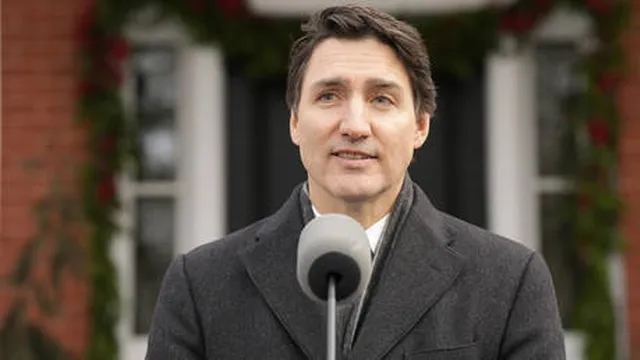
Donald Trump calls for Canada to become the 51st state after Trudeau's resignation
2025-01-09 16:45- Justin Trudeau resigned citing internal party conflicts amid pressure from Trump's proposed tariffs.
- Trump suggested on Truth Social that Canada should annex to the U.S., claiming many Canadians would support it.
- The idea of Canadian annexation prompted mixed reactions, especially amid concerns of sovereignty and political independence.
Express your sentiment!
Insights
In January 2025, following the resignation of Canadian Prime Minister Justin Trudeau, Donald Trump, then president-elect, expressed his desire for Canada to join the United States as its 51st state. Trudeau's resignation was due to internal conflicts within the Liberal Party and was influenced significantly by Trump’s proposed 25% tariff on imports from Canada, which he asserted would help alleviate trade deficits. Trump made these remarks on his Truth Social platform, claiming that many Canadians would love the idea of being part of the U.S. and arguing that merging the two nations would eliminate tariffs, reduce taxes, and bolster security against foreign threats. Despite the entertaining remarks, the proposal has garnered mixed reactions. Conservative Party leader Pierre Poilievre publicly rejected Trump’s suggestion, asserting Canada’s sovereignty and independence. Canada's political landscape was already unsettled prior to Trudeau's resignation due to challenges related to immigration and economic concerns, problems exacerbated by the fear of tariffs imposed by the incoming U.S. leadership. Trudeau had previously attempted to engage directly with Trump but faced mockery when Trump called him the ‘governor of Canada’ during a private dinner, reflecting an animosity that further complicated diplomatic relations. The notion of Canada becoming a U.S. state has historical precedent given Canada’s origins including a past under British rule and its gradual development as a self-governing entity separate from the U.S. post-independence in the 18th century, a narrative that Trump seems to overlook. While Trump’s suggestion may have been met with laughter or disdain in some circles, investor and TV personality Kevin O’Leary claimed that a faction of Canadians would be supportive of this idea, highlighting ongoing divisions in Canadian sentiment towards the U.S. As Canada braces for a potential shift in leadership with the upcoming elections, many citizens remain skeptical about any considerations of annexation, emphasizing national pride and political independence. Ultimately, Trump's proposal showcases the fragility of the relationship between neighboring countries and raises questions about how future U.S.-Canada relations may evolve especially under a new Canadian prime minister. The repercussions of such unorthodox suggestions from a leading U.S. figure significantly impact Canadian political discussions as the nation prepares for upcoming elections where these themes may surface in various forms.
Contexts
The history of relations between Canada and the United States is marked by a complex interplay of cooperation, conflict, and mutual influence, shaping the political, economic, and cultural landscapes of both nations. From the early days of colonial settlement, there was a significant interaction between these regions, as both were initially part of British colonial rule. The American Revolution (1775-1783) prompted a major shift, leading to the establishment of the United States as an independent nation. In the aftermath, many Loyalists, who remained loyal to the British crown, fled to what is now Canada, thus forging early ties through shared governance and culture, yet also laying the groundwork for differing national identities and political ideals. The War of 1812 further intensified these relations, with conflicts arising from trade issues and territorial disputes, resulting in a sense of greater unity within Canada against a common foe, albeit in a limited and defensive manner. The 19th century saw increasing economic interdependence, especially through trade, as both countries sought to expand their influence. The construction of railroads and the establishment of the telegraph facilitated communication and the movement of goods across borders. The signing of treaties, like the Reciprocity Treaty of 1854, highlighted the desire for closer economic ties and a mutual benefit approach. As Canada gradually moved towards confederation in 1867, its relationship with the United States began reflecting a balance of admiration and wariness, with Canada adopting a gradualist approach to independence while still being heavily influenced by American economic practices and governance models. In the 20th century, Canada and the U.S. found themselves as partners rather than adversaries, particularly during the World Wars and in the context of the Cold War. Canada’s participation alongside the United States in both global conflicts solidified an understanding of shared security and defense strategies. The establishment of organizations such as the North Atlantic Treaty Organization (NATO) in 1949 underscored the importance of military cooperation. Moreover, initiatives like the North American Free Trade Agreement (NAFTA) in 1994 marked a critical development in bilateral economic relations, significantly increasing trade flows and investment and fostering a deeper economic integration that remains influential to this day. In contemporary times, the relationship continues to evolve in response to global challenges, including climate change, terrorism, and trade disputes. The post-9/11 period brought new security measures that affected cross-border movement and cooperation. While there are occasional tensions regarding trade policies, immigration, and environmental regulations, Canada and the U.S. maintain one of the largest trading partnerships in the world. Mutual interests and challenges ensure that the relationship continues to adapt, demonstrating resilience and an enduring commitment to collaboration. As both nations look to the future, their ties remain essential not only for their respective national interests but also for regional stability and prosperity.